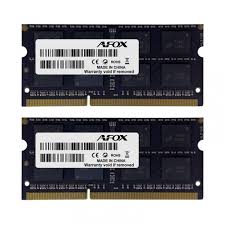It seems like you're referring to an AFOX laptop with DDR3 RAM, specifically with an 8GB capacity and a clock speed of 1600MHz. Here's a breakdown of the details:
1. **DDR3 RAM**: DDR3 (Double Data Rate 3) is an older type of computer memory that was commonly used in systems from around 2007 to the mid-2010s. While it has been largely replaced by DDR4 in newer systems, DDR3 RAM is still widely used in older computers and some budget systems.
2. **8GB Capacity**: The RAM module you mentioned has a capacity of 8 gigabytes (GB). This is the amount of memory available for running programs and storing temporary data while your computer is in use. Upgrading from 4GB to 8GB can provide a noticeable improvement in multitasking performance and overall system responsiveness, especially for tasks that require more memory.
3. **1600MHz Clock Speed**: The RAM module operates at a clock speed of 1600 megahertz (MHz). This refers to the speed at which data can be transferred to and from the RAM module. While 1600MHz is a standard speed for DDR3 RAM, it's worth noting that higher clock speeds can result in better performance, although the real-world difference might not always be significant for typical usage.
4. **Compatibility**: It's essential to ensure that any RAM you purchase is compatible with your laptop's motherboard. This includes factors such as the type (DDR3), capacity (8GB), and speed (1600MHz). Additionally, some laptops may have limitations on the maximum amount of RAM they can support or require specific configurations (e.g., single-channel vs. dual-channel memory).
5. **Performance**: Upgrading to 8GB of RAM can significantly improve system performance, especially if your laptop currently has insufficient memory for the tasks you're performing. With 8GB of RAM, your system will be better equipped to handle multitasking, resource-intensive applications, and modern operating systems.
6. **Considerations**: While upgrading RAM can be beneficial, it's essential to consider other factors that may affect system performance, such as the CPU, storage (HDD/SSD), and overall system architecture. Additionally, be sure to purchase high-quality RAM from reputable manufacturers to ensure reliability and compatibility with your laptop.
If you have any further questions or need assistance with upgrading your laptop's RAM, feel free to ask!
